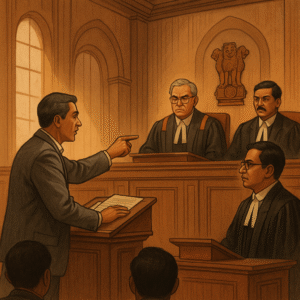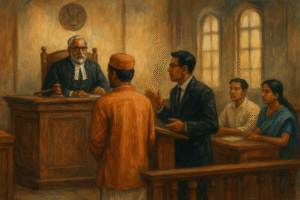The Patna High Court has clarified an important issue under the Goods and Services Tax (GST) regime: what happens to an assessee’s right to appeal, and the corresponding “pre-deposit” percentage, when the State has not yet constituted the GST Appellate Tribunal. In a writ petition decided on 29 October 2024, the Court recognized that Parliament has amended Section 112 of the Central GST Act, 2017 to reduce the pre-deposit for filing an appeal before the Tribunal from 20% to 10%. However, because the Tribunal was still not functional, the Court stepped in to prevent taxpayers from being prejudiced by the State’s own delay.
The Court recorded that earlier, in the absence of a Tribunal, it had been issuing protective orders based on a prior judgment (SAJ Food Products Pvt. Ltd. v. State of Bihar), allowing stay of recovery upon deposit of 20% of the disputed tax demand. With the statutory amendment now reducing the pre-deposit to 10%, and with the Central and State GST Tribunals still not constituted, the Court concluded that assessees should not be compelled to deposit the higher amount merely because the appellate forum is unavailable. Therefore, it directed that payment of 10% of the disputed tax would entitle the taxpayer to a stay on recovery until the Tribunal is set up and the appeal is filed within the period prescribed once the Tribunal becomes functional.
Importantly, the Court harmonized three moving parts: (i) the statutory right of appeal and the pre-deposit condition (now 10% by amendment), (ii) the continuing non-constitution of the Tribunal, and (iii) the need to protect revenue without unfairly burdening assessees. It emphasized that the interim protection cannot be “open-ended.” The stay will continue only until the Tribunal becomes operational; once constituted and the President (or State President) assumes office, the taxpayer must file the appeal under Section 112, fulfilling all statutory formalities and timelines. If the taxpayer chooses not to file the appeal within the eventual statutory window, the authorities are free to proceed in accordance with law.
The Court also provided pragmatic relief regarding coercive measures: upon deposit of the requisite 10%, any bank account attachment arising out of the impugned demand must be released. This ensures that businesses are not strangled financially while awaiting an appellate forum that should already have been in place.
Overall, the judgment carefully balances the equities. It aligns interim relief with the amended statutory pre-deposit (10%), avoids penalizing taxpayers for the State’s administrative delay in constituting the Tribunal, and preserves the department’s right to recover dues should the assessee ultimately fail to pursue the appellate remedy in time. The decision thus offers a clear, workable roadmap for taxpayers and tax officers during the transitional period before the Tribunal becomes fully functional.
Significance or Implication of the Judgment
This judgment is significant for both the public and the government:
- For taxpayers (assessees): It prevents undue hardship. Assessees facing disputed GST demands gain immediate clarity: deposit 10% of the disputed tax to secure a stay of recovery until the Tribunal is formed, and then promptly file the appeal once the Tribunal opens. This clarity helps in cash-flow planning and legal strategy, especially for MSMEs and service providers with tight working capital.
- For government and tax administration: The order respects revenue concerns while ensuring fairness. It does not waive the deposit; it merely syncs the interim requirement with the amended law (10%). It also sets a firm expectation that appeals must be filed as soon as the Tribunal becomes functional, thus avoiding indefinite litigation limbo.
- For the GST appellate framework: The decision underscores the systemic need to promptly constitute Tribunals so that statutory remedies function as intended. Until then, this ruling operates as a practical bridge.
Legal Issue(s) Decided and the Court’s Decision with reasoning
- Issue 1: What pre-deposit applies for an appeal to the (not yet functional) GST Tribunal—20% or 10%?
Decision: 10%. The Court noted that Section 112 has been amended to reduce pre-deposit to 10%, effective 01.11.2024. In the continuing absence of the Tribunal, requiring 20% would be unfair and contrary to the amended legislative scheme. Hence, payment of 10% of the disputed tax suffices to obtain interim stay pending the Tribunal’s constitution. - Issue 2: Can recovery proceedings continue while the Tribunal is not constituted if the taxpayer is ready to make the pre-deposit?
Decision: No. Upon deposit of 10% of the disputed tax, the assessee is entitled to stay of recovery until the Tribunal becomes functional and the appeal is duly filed within the prescribed period. This prevents the State’s administrative delay from depriving taxpayers of the statutory “stay” contemplated by Section 112(9). - Issue 3: Is the interim stay open-ended?
Decision: No. The stay is time-bound and conditional. Once the Tribunal is constituted and the President/State President assumes office, the taxpayer must file the appeal under Section 112 in accordance with law. Failure to do so allows the authorities to proceed further. - Issue 4: What happens to existing coercive measures such as bank account attachment?
Decision: If the taxpayer deposits the 10% amount, any bank account attachment pursuant to the demand must be released.
Judgments Relied Upon or Cited by Court
- SAJ Food Products Pvt. Ltd. v. State of Bihar & Ors., C.W.J.C. No. 15465 of 2022 — Referred to as the earlier basis on which interim orders were granted requiring 20% deposit when the Tribunal was absent. The present order aligns the interim deposit with the subsequent statutory amendment to 10%.
Case Title
M/s Shakti Infotech Pvt. Ltd. Vs. The Union of India
Case Number
CWJC No. 16663 of 2024.
Coram and Names of Judges — Always prefix with Hon’ble
Hon’ble the Chief Justice K. Vinod Chandran and Hon’ble Mr. Justice Partha Sarthy (Oral Judgment dated 29-10-2024).
Names of Advocates and who they appeared for
- For the petitioner: Mr. Vikash Kumar Pankaj, Advocate.
- For the respondents (Union/CGST/State): Dr. K. N. Singh, ASG; Mr. Anshuman Singh, Sr. SC, CGST & CX; Mr. Shivaditya Dhari Sinha, AC to ASG; Mr. Devansh Shankar Singh, JC to ASG.
Link to Judgment
MTUjMTY2NjMjMjAyNCMxI04=-a0GiCFLEjng=
If you found this explanation helpful and wish to stay informed about how legal developments may affect your rights in Bihar, you may consider following Samvida Law Associates for more updates.







